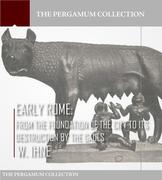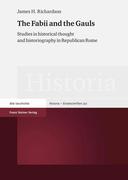47 Results for : gauls
-

The Roman Republic (eBook, ePUB)
Between the Sack of Rome by the Gauls in 390 BC and the middle of second century BC, a part-time of Roman peasants, under the leadership of the ruling oligarchy, conquered first Italy and then the whole Mediterranean. The loyalty of these marauding adventures, and of the Roman population as a whole, to their leaders was assured by a share in the rewards of victory, rewards that became steadily less accessible as the empire expanded - prompting a decline in loyalty or cataclysmic proportions. "During the centuries of its history the republic burst its city-state shell... Wars, rural impoverishment, the concentration of wealth in the hands of a few families, civil discord, the increase in number of slaves and robbery of overseas provinces caused irreversible changes... This is the material of Mr. Crawford's study.He handles its complexities with acuteness and balance. He is sophisticated about political motives and economic causes... his highly readable book is a fine contribution to the understanding of this important period."TIMES HIGHER EDUCATION SUPPLEMENT "Well informed, lively... For its length... the work conveys a remarkable quantity of information... students will benefit greatly from Crawford's obvious enthusiasm for historical research and for finding explanations of complex phenomena."JOURNAL OF ROMAN STUDIES- Shop: buecher
- Price: 6.99 EUR excl. shipping
-

The Sack of Rome by the Visigoths in 410 A.D.: The History of the Event that Marked the Final Decline of the Western Roman Empire , Hörbuch, Digital, ungekürzt, 96min
The City which had taken the whole world was itself taken. (St. Jerome) For the people of the ancient Mediterranean and beyond, the city of Rome had been a symbol of power for centuries, and entering the early 5th century AD, the Eternal City hadn't been taken by an enemy force since the Gauls had done it about 800 years ago, an unheard of period of tranquility in a world wracked with almost constant warfare. Thus when the Visigoths, who the Romans considered uncultured and inferior, took the city of Rome and sacked it in 410, the world was stunned. It made theologians of the newly Christianized empire question God's plan on Earth, and it encouraged many leading Romans to look east to Constantinople for their future. Indeed, the Western Roman Empire would completely collapse in the late 5th century, less than 70 years after the Visigoths sacked Rome, and just how it went from being a superpower to a poorly led, weak, and vulnerable shadow of its former self has preoccupied historians for centuries. To this day it remains difficult to trace just when the decline began, but it's fair to say that the sack of Rome was the result of a number of factors that had been coalescing for many years. Only Roman arrogance kept the empire from seeing the grave peril its capital was in, which helped bring about the events leading up to that fateful day, but either way the sack of Rome had world-changing ramifications. The Sack of Rome by the Visigoths in 410 A.D. analyzes the history and legacy of the most famous sack of the Eternal City. You will learn about the Sack of Rome in AD 410 like never before, in no time at all. ungekürzt. Language: English. Narrator: Sallie Downing. Audio sample: https://samples.audible.de/bk/acx0/034540/bk_acx0_034540_sample.mp3. Digital audiobook in aax.- Shop: Audible
- Price: 9.95 EUR excl. shipping
-

Roman Gaul: The History of Gaul as a Province of the Ancient Roman Empire , Hörbuch, Digital, ungekürzt, 132min
In the minds of most people today, Gaul equates to modern France. However, the vast geographical area that Caesar named Gaul, in fact, was made up of a number of very distinct regions and covered, in addition to modern-day France, Belgium, Luxembourg, parts of the Netherlands, Germany, Switzerland, and Northern Italy. The Romans called the northern area of the Italian peninsula, which is now part of modern Italy, Cisalpine Gaul, or Gaul on this side of the Alps. Early Romans did not even consider this region as part of Italy and repeated incursions southwards, and the sacking of Rome itself in 390 BCE, resulted in Rome taking full control of the area in 221 BCE and thoroughly Romanizing it to the extent that even the Celtic language totally disappeared and was replaced by Latin. The region was initially a province but by the beginning of the first century BCE, it had become fully integrated into the Roman heartland and became an administrative region of Italy rather than a province. Ironically, the Roman Republic’s development from a city state into a world power that controlled large swathes of modern Italy, Gaul and Spain, as well as other parts of Europe is seen by many as being the direct result of Roman fear of the “Celtic Threat.” The sacking of Rome by the Gauls in 386 BCE became indelibly imprinted into the Roman psyche, and with this fear came a desire to put as much distance as possible between the city of Rome and any potential enemy. The result was the gradual acquisition of buffer zones that became provinces of an empire that grew without any particular thought or deliberate strategy of expansion.The Gallic Wars, the series of campaigns waged by Caesar on behalf of the Roman Senate between 58-50 BCE, were among the defining conflicts of the Roman era. Not only was the expansion of the Republic’s domains unprecedented (especially when considering it was undertaken under the auspices of a single general), it had a profound cultural impact ungekürzt. Language: English. Narrator: Colin Fluxman. Audio sample: https://samples.audible.de/bk/acx0/127158/bk_acx0_127158_sample.mp3. Digital audiobook in aax.- Shop: Audible
- Price: 9.95 EUR excl. shipping
-

Gaul and the Roman Republic: The History of Gaul Before the Rise of Rome , Hörbuch, Digital, ungekürzt, 99min
The Roman Republic’s development from a city state into a world power that controlled large swathes of modern Italy, Gaul, and Spain, as well as other parts of Europe is seen by many as being the direct result of Roman fear of the “Celtic Threat”. The sacking of Rome by the Gauls in 386 BCE became indelibly imprinted into the Roman psyche, and with this fear came a desire to put as much distance as possible between the city of Rome and any potential enemy. The result was the gradual acquisition of buffer zones that became provinces of an empire that grew.The Gallic Wars, the series of campaigns waged by Julius Caesar on behalf of the Roman Senate between 58-50 BCE, were among the defining conflicts of the Roman era. Not only was the expansion of the Republic’s domains unprecedented (especially when considering it was undertaken under the auspices of a single general), it had a profound cultural impact on Rome itself as well. The Roman Republic, so dynamic in the wake of the destruction of their ancient enemy, Carthage, had recently suffered a series of dramatic upheavals; from the great slave rebellion of Spartacus to the brutal and bloody struggle for power of Marius and Sulla. Rome had been shaken to its very core, and a victory was essential both to replenish the dwindling national coffers and to instill in the people a sense of civic pride and a certainty in the supremacy of the Republic.Quite simply, in terms of scale, the Gallic Wars were unmatched by anything the Roman Republic had witnessed since the Punic Wars. By the end of the campaigns, ancient historians estimated that more than a million people had died, and still more were displaced or enslaved. Even by the more conservative estimates of modern historians, a casualty count in the hundreds of thousands appears possible. Either way, the war was a cataclysm, involving tens of thousands of combatants, and it also marked the greatest displays of skill by one of the greatest battlefield ge ungekürzt. Language: English. Narrator: Colin Fluxman. Audio sample: https://samples.audible.de/bk/acx0/122922/bk_acx0_122922_sample.mp3. Digital audiobook in aax.- Shop: Audible
- Price: 9.95 EUR excl. shipping
-

Early Rome
Early Rome - From the Foundation of the City to Its Destruction by the Gauls: ab 1.93 €- Shop: ebook.de
- Price: 1.93 EUR excl. shipping
-

Cheesy? How raw milk cheese made its way through the EU's legislative procedure like the village of indomitable Gauls
Cheesy? How raw milk cheese made its way through the EU's legislative procedure like the village of indomitable Gauls: ab 12.99 €- Shop: ebook.de
- Price: 12.99 EUR excl. shipping
-

The Fabii and the Gauls
The Fabii and the Gauls - Studies in historical thought and historiography in Republican Rome: ab 52 €- Shop: ebook.de
- Price: 52.00 EUR excl. shipping